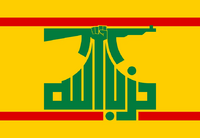Hazameh
| Hazameh | |
|---|---|
| حزامه | |
 | |
| Leader | Rezan Pavlavi |
| Foundation | Qutb el-Waheed |
| Dates of operation | 1976-present |
| Country | Kulkkistan |
| Allegiance | |
| Motives | Unconditional military support of the Udonovi Republic |
| Ideology | Akhist nationalism Pan-Akhism Udonovism Secterianism Anti-foreigner sentiment Populism anti-imperialism anti-capitalist sentiment Kulkkistani nationalism |
| Major actions | Armed attacks, border incursins, bombings, attacks against civilians, civilian massacres, acts of religious and ethnic persecution |
| Size | ~125,000 combatants |
| Allies | State allies Non-state allies |
| Opponents | State opponents Non-state opponents |
| Battles and wars | 1980 Kulkkistani Revolution Balto-Kulkkistani border conflict Kulkkistani internal conflict(1980-1988) 1986 Balto-Kulkkistani clashes 2001 southern Baltocarpathia incursion 2001 Balto-Kulkkistani border war |
Hazameh is a Kulkkistani Akhist and Udonovist militant group, founded by Qutb el-Waheed, a militant fighter throughout the 1970s. Although it has a political wing, it is mainly active through its paramilitary wing, where it supports the Kulkkistani military through a shared Udonovist ideology and opposition to a majority of liberal and foreign ideologies.
Hazameh was established in 1976, in opposition to the Empire of Kulkkistan and Vayzer Abdhu Suleiman. During the 1980 Kulkkistani Revolution, it assisted revolutionaries in overthrowing the Vayzer, and swore loyalty to Supreme Leader Ali Tarrokh. After the revolution, Hazameh engaged in operations, aimed at wiping out any remaining anti-revolutionary and anti-Udonovist groups that were formed following the revolution. Alongside this, the group clashed with Baltocarpathia's military forces on the border, amidst heightened tensions between them and Kulkkistan, after Baltocarpathia allowed the Vayzer to seek refuge. Throughout the 1980s, the organization was heavily expanded, as it received training from the Kulkkistani Special Akhist Services, as well as equipment through the establishment of a black market in which it received armaments from multiple foreign sellers. Since the late 1980s, Hazameh has occassionally clashed with Baltocarpathian forces on the border, mainly through the use of artillery, rockets, and drones.
In 2001, the Balto-Kulkkistani border conflict took a turn when a series of clashes culminated into a large-scale border incursion into Baltocarpathia by Hazameh and other militant groups, which resulted in the deaths of several Baltocarpathians. In response, Baltocarpathia launched aerial operations and ground raids into northern Baltocarpathia, leading to a full-scale conflict between Baltocarpathian and Kulkkistani forces. However, the conflict was quickly resolved following the 2001 Salis Agreement, in which Kulkkistan agreed to force the militant groups to cease their attacks. A split soon arose between Hazameh and the Udonovi Republic for a while, as both sides ceased communications and often clashed between each other. However, after the Baltocarpathian Civil War kicked off, Hazameh and the Udonovi Republic reached common grounds in order to prevent a spillover. Since then, both sides have enjoyed very well relations, as Kulkkistan outlined foreign threats in the Sehat Doctrine.
Hazameh currently numbers around 125,000 fighters, being one of the largest militant groups in the world. The group's strong influence has also even forced Noshkant to allow Hazameh to directly occupy many isolated towns and communities for the Udonovi Republic, in order to counter the threat of domestic dissent. Hazameh has also formed its own TV station, radio station, and social service, which it regularly attempts to broadcast from northern Kulkkistan into southern Baltocarpathia. The group receives large-scale funding from Kulkkistan, along with potential funding from Otyken, as Otykenese equipment has previously been captured from Hazameh militants. Currently, Baltocarpathia has recognized and designated Hazameh as a terrorist group along its borders, putting all forces there on high alert.